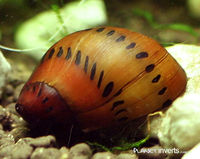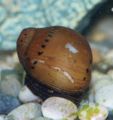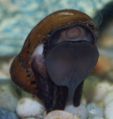Ruby Nerite Snail (Neritina natalensis sp)
From The Aquarium Wiki
| You can contribute to the Aquarium Wiki by expanding this article. Dont be shy!. |
Ruby Nerite Snail
Neritina natalensis sp
19 Litres (5 US G.)
1.3-3.2cm (0.5-1.25 ")
7.1 - 8.5
18 -28 °C (64.4-82.4°F)
8-12 °d
1:1 M:F
5-10 years
This animal is available captive bred
Contents
Alternative names
- Ruby Nerite Snail, Red Spotted Snail, Tracked Nerite Snail
Sexing
- Nerites are not hermaphrodites, their are separate sexes of male and female snails. It will lay eggs in freshwater, but they won't survive since the young need brackish conditions to live.
Tank compatibility
- A peaceful snail, will not bother tank inhabitants. However, should not be kept with aggressive fish that may try to eat it such as Loaches or Pufferfish.
Diet
- This snail is a great algae eater. Generally will not touch plants if there is algae present and will eat most types of algae. If no algae is present the snail will have to be supplemented with blanched vegetables and algae wafers.
Feeding regime
- Will constantly graze in its environment.
Environment Specifics
- Needs a spacious well oxygenated tank with plenty of algae to eat. If put in a new tank with no algae present and not supplemented, it can starve. A tight fitting lid is a must as these snails can be escape artists.
- must have water with a pH of greater than 7 and GH of greater than 5°d otherwise the shell will dissolve away and the snail will die.
- The presence of copper in the water will kill it.
- If properly acclimated to full strength saltwater, they can be home in a marine setup
Behaviour
- An attractive snail that will not multiply. They may lay lots of white/yellow eggs however, but they will not hatch. The young need brackish, or saltwater conditions, due to the fact that the larvae need calcium, and minerals to build up their shell; for this reason, you will have the most success rearing them in full-strength marine, and the adults can call brackish, and marine setups home. The eggs harden and can be difficult to remove.
- This snail is a gill breather.
Identification
- A pretty rounded smooth shell with a deep golden brown colour with several bands of black dots. White skin deeply mottled with black pigment.
Pictures
External links
- WindyCityAquariums.com - USA Seller
- SnailShop UK selling Rubys
- Aqua Essentials selling Rubys
- Commercial supplier listing Red Spotted Snails
- Planet Inverts


